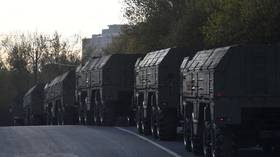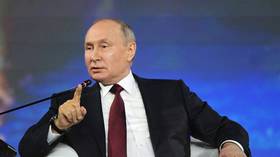Russian nukes in Belarus indefinitely – senior diplomat

The agreement between Moscow and Minsk to deploy tactical nuclear weapons on the territory of Belarus does not imply any time limits, a Russian Foreign Ministry official has said. The first batch of nuclear warheads had already arrived in Belarus last week.
Speaking to media on Monday, Alexei Polishchuk, who serves as the director of the Russian Foreign Ministry’s second department of CIS countries, explained that Moscow’s decision to proceed with the placement of its nuclear weapons in Belarus came as a “forced response” to the aggressive policies of the US and NATO.
He noted that when the details of the Moscow-Minsk agreement were being ironed out, the two sides considered the “years-long destructive practices” of joint nuclear missions of NATO member states.
Polishchuk stressed, however, that “unlike American warheads in Europe,” Russia’s weapons will be located in close proximity to its own borders and on the territory of the Union State of Russia and Belarus.
The senior diplomat suggested that the Russian nuclear weapons could hypothetically be withdrawn from the territory of Belarus. However, he explained that Moscow would only consider such an option if the US eliminated its own nuclear infrastructure in Europe.
“Of course, such a step on our part would have to be preceded by the complete withdrawal of all American nuclear weapons back to US territory and by the elimination of all relevant infrastructure in Europe,” Polishchuk said.
On Friday, President Vladimir Putin announced during the St Petersburg International Economic Forum that a number of Russian low-yield warheads had already arrived on the territory of Belarus. He noted that this was the first batch and that the full deployment of Russian nuclear weapons in the neighboring country will be completed by the end of the year.
The Russian president first announced in late March that tactical nuclear weapons would be stationed in Belarus. He said the move had been prompted by the UK’s decision to provide Kiev with depleted uranium munitions amid the ongoing conflict in Ukraine.
Belarus, meanwhile, had been asking Russia, its closest ally, to deploy nuclear weapons on its territory, citing aggressive Western policies towards the country and the perceived threat posed by US nuclear weapons deployed in neighboring European countries.
Russian officials have stressed, however, that despite being deployed in Belarus, control over the nuclear warheads will remain with Moscow.













